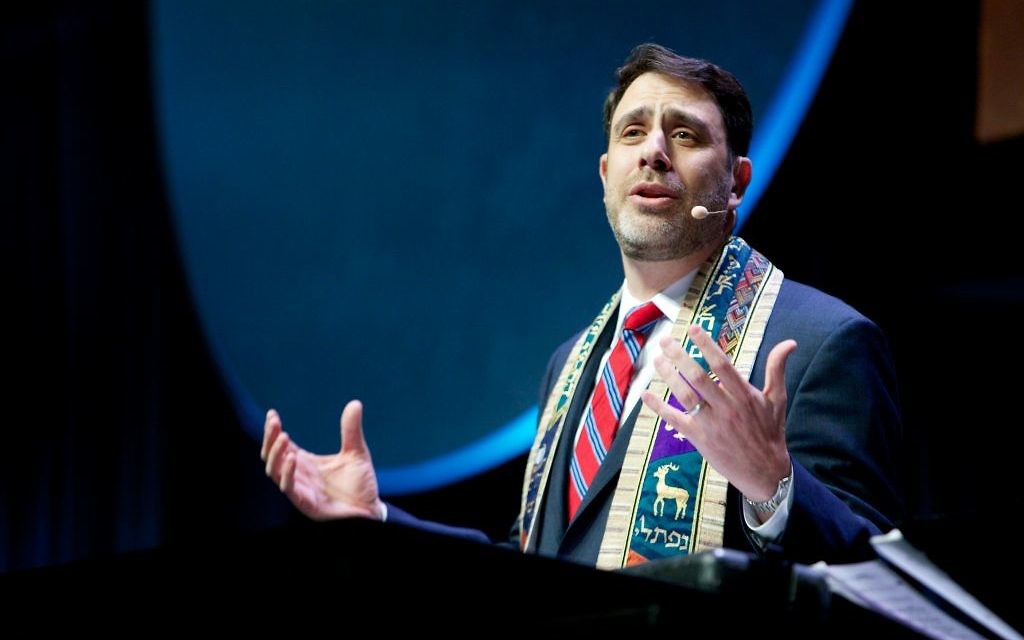Yes, and Yet: Responding to the Lack of Civil Discourse
Rabbi Peter Berg relays that idolatry still exists today – not in the form of stones, but in the realm of ideas.
Despite the tone we see all about us, narrow-mindedness is not very Jewish. To be Jewish is to struggle with contradiction. If the Talmud teaches us anything, it is that there is more than one way to solve a dispute or dilemma. Yet, many in our troubled world hang on to the belief that there is a singular way. If we believe in the rightness of our own convictions, then it follows that those who uphold opposing views are denying the truth and luring others into falsehoods. From there, it is a short step to thinking of ourselves as morally entitled or even obligated to silence those with differing ideas.
History has taught us that, if we believe that there is only one valid truth or faith, then violence and death are sure to follow. Idolatry still exists today – not in the form of stones, but in the realm of ideas. Our world is threatened by people who refuse to recognize the beauty of pluralism, by those who think it is “my way or the highway!”
To be sure, we all have strong opinions about the issues of the day: whether health care is a right or a privilege, how we should set policy regarding immigration, the best way to solve peace in the Middle East. The list of challenges we face is as numerous as the sands in the sea and stars in the sky. Generally, we believe that our personal opinion is the truth.
Get The AJT Newsletter by email and never miss our top stories Free Sign Up
Since being right feeds our egos and brings satisfaction, it is logical that being wrong is embarrassing and deflating. In America today, it seems impossible to admit that we are incorrect, to realize that we made a mistake halfway through an argument or to discover that we may have erred regarding politics, faith or our life’s work.

In fact, because we are so threatened by being wrong, we sometimes fail to look into information that doesn’t confirm our beliefs. As a result, we underexpose ourselves to the opposition. We are fairly good at acknowledging the errors of others, but seldom can we say that about ourselves. The strife in our world would be enough, but it is escalated by our unshakable feelings of correctness. Day after day, we watch politicians who study issues and change their minds. We respond by calling them flip-floppers! A mature society would allow for individual beliefs to evolve.
Our community can play a major role in this conversation. Our job is to utilize the ability of religion, Judaism specifically, to contextualize the big issues of the day in the most universal of terms. What we need more of is to engage in dialogue without unleashing the genies of intolerance and self-righteousness – to truly listen to each other with an open heart.
We can’t ignore our principled opinions, but we still have to be able to live with one another. The challenge of American democracy – and especially of the religious community – is to fashion a way that people who hold incompatible assertions of faith and belief can still talk with, and learn from each other.
We live in a time of clashing civilizations, cultures and religions. Our public discourse in every avenue is far from civil. By and large, the end result of public conversations is to turn the other into an enemy. Our challenge is to wrestle with our core beliefs such as compassion and respect, admitting when we have made a mistake. These values bind us together in the most universal sense.
The Talmud is a record of rabbinic conversations from the first century. Often, an argument takes place without resolution. We are enriched not by the final answer, but by the discussion. Even when a legal ruling is issued, the rabbis often record the entire conversation. Multiple opinions convey the idea that other points of view expand our vision and deepen our understanding of the truth. The early rabbis teach us that we can sometimes answer a question with Yes and Yes, or at other times we may say Yes and Yet.
Let us learn to speak with each other in ways that we can all hear, in words that allow for learning and growth, even amidst disagreements.
Peter S. Berg is the senior rabbi at The Temple.





comments